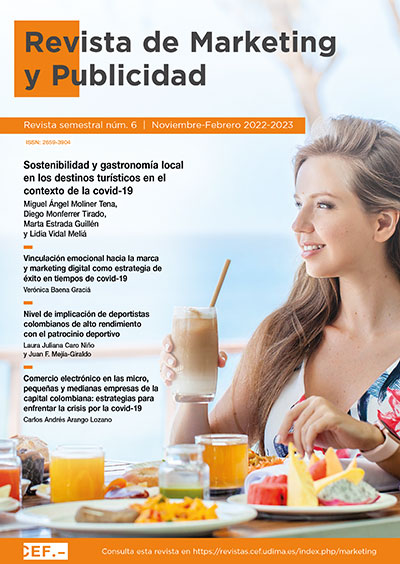Vinculación emocional hacia la marca y marketing digital como estrategia de éxito en tiempos de covid-19
DOI:
https://doi.org/10.51302/marketing.2022.3497Palabras clave:
amor a la marca, marketing digital, página web, Facebook, Instagram, Twitter, covid-19Resumen
Este trabajo ha obtenido un accésit en el Premio Estudios Financieros 2022 en la modalidad de Marketing y Publicidad.
La pandemia de la covid-19 ha originado una crisis económica global sin precedentes. Todos los sectores de actividad se han visto afectados y se han enfrentado a serias amenazas financieras. Por este motivo, en un contexto de restricciones físicas durante la crisis de la covid-19 (confinamiento y nueva normalidad), es necesario analizar la idoneidad de enfatizar el uso de una estrategia de marketing digital como herramienta de comunicación a los consumidores. Mediante una investigación mixta basada en la combinación de un análisis cuantitativo (encuesta y posterior análisis econométrico) y cualitativo (grupo de discusión), este artículo pretende identificar el papel de la web, app y redes sociales de la compañía en la creación de un vínculo emocional hacia la marca.
Descargas
Citas
AIMC (Asociación para la Investigación de Medios de Comunicación). (2017). Navegantes en la Red. https://www.aimc.es/otros-estudios-trabajos/navegantes-la-red/
Albert, N., Merunka, D. y Valette-Florence, P. (2009). The feeling of love towards a brand: Concept and measurement. Advances in Consumer Research, 36, 300-307.
Anagnostopoulos, C. Parganas, P., Chadwick, S. y Fenton, A. (2018). Branding in pictures: using Instagram as a brand management tool in professional team sport organizations. European Sport Management Quarterly, January, 1-26. https://doi.org/10.1080/16184742.2017.1410202
Arumugam, N., Anuar, N., Selvanayagam, S. y Sathiyasenan, S. D. (2021). The Impact of COVID-19 on the Sport Industry. International Journal of Academic Research in Business and Social Sciences, 11(10), 397-411.
Baker, G. (2021). Real Madrid announces a surplus of 874,000 euros. https://sportsfinding.com/real-madrid-announces-a-surplus-of-874000-euros/105560/
Balmer, J. Greyser, S. y Urde, M. (2006). The crown as a corporate brand: insights from monarchies. Journal of Brand Management, 14, 137-161.
Batra, R., Ahuvia, A. y Bagozzi, R. (2012). Brand love. Journal of Marketing, 76, 1-16.
Bauer, H., Sauer, N. E. y Schmitt, P. (2005). Customer-based brand equity in the team sport industry. Operationalization and impact on the economic success of sport teams. European Journal of Marketing, 39(5/6). 496-513. https://doi.org/10.1108/03090560510590683
Beiderbeckc, D., Frevel, N., Heiko A., Von der Gracht, H., Schmidt, S. y Schweitzer, V. (2021). The impact of COVID-19 on the European football ecosystem – A Delphi-based scenario analysis. Technological Forecasting & Social Change, 165(120577), 1-17. https://doi.org/10.1016/j.techfore.2021.120577
Bergkvist, L. y Bech-Larsen, T. (2010). Two studies of consequences and actionable antecedents of brand love. Journal of Brand Management, 17, 504-518. https://doi.org/10.1057/bm.2010.6
Bühler, A. y Nufer, G. (2016). Relationship marketing in sports. Building and establishing longstanding relations in the business of sports. En S. N. Chadwick y M. Chanavat.
Carroll, B. y Ahuvia, A. (2006). Some antecedents and outcomes of brand love. Marketing Letters, 17, 79-89.
Deloitte. (2020). Football Money League 2020.
Didi, J. (2018). The effect of corporate social responsibility on fans’ engagement: evidence and implications for a professional soccer club. [Tesis doctoral]. Harvard Extension School.
García, C. (2020). Real Madrid and public relations: applying the circuit of culture to organizational values. Soccer & Society, 1-15. https://doi.org/10.1080/14660970.2020.1824909
Gutiérrez, A. (2021). Hasta Tebas se rinde a Florentino Pérez: El Real Madrid es el club europeo que mejor ha gestionado la pandemia. https://diariomadridista.okdiario.com/real-madrid/tebas-rinde-florentino-perez-134446
Harwood, J. (2020). Social identity theory. En J. van den Bulck (Ed.), International encyclopedia of media psychology. Wiley.
Hayes. M. (2020). Social media and inspiring physical activity during COVID-19 and beyond. Managing Sport and Leisure, 1-8. https://doi.org/10.1080/23750472.2020.1794939
Hirshon, N. (2020). Social Identity Theory in sports fandom research. En R. A. Dunn (Ed.), Multidisciplinary Perspectives on Media Fandom (Capítulo 10, pp. 172-191). IGI Global.
Hogg, M., Terry, D. y White, K. (1995). A tale of two theories: A critical comparison of Identity Theory with Social Identity Theory. Social Psychology Quarterly, 58, 255-269. https://doi.org/10.2307/2787127
Hollebeek, L. (2011). Demystifying customer brand engagement: exploring the loyalty nexus. Journal of Marketing Management, 27(7-8), 785-807 https://doi.org/10.1080/0267257X.2010.500132
Ioakimidis, M. (2010). Online marketing of professional sports clubs: engaging fans on a new playing field. International Journal of Sports Marketing & Sponsorship, July, 271-282. https://doi.org/10.1108/IJSMS-11-04-2010-B002
Kaynak, E., Gultekin, G. y Tatoglu, E. (2008). An integrative framework linking brand associations and brand loyalty in professional sports. Journal of Brand Management, 15(5), 336-357.
KPMG. (2020). European Elite 2020 Report.
Lawrence. S. y Crawford, G. (2021). Towards a digital football studies: current trends and future directions for football cultures research in the post-COVID-19 moment. Leisure Studies, 1-14. https://doi.org/10.1080/02614367.2021.1948595
Li, H., Edwards, S. M. y Lee, J.-H. (2002). Measuring the Intrusiveness of Advertisements: Scale Development and Validation. Journal of Advertising, 31(2). 37-47. https://doi.org/10.1080/00913367.2002.10673665
Li, T., Lulu Hao, L., Kubiczek, J. y Pietrzyk, A. (2021). Corporate social responsibility of sports club in the era of coronavirus pandemic, Zagłbie Sosnowiec case study. Economic Research - Ekonomska Istraživanja.
Mael, F. y Ashforth, B. (1992). Alumni and their alma mater: A partial test of the reformulated model of organizational identification. Journal of Organizational Behavior, 13, 103-123.
Maguire, K. (2021). COVID-19 and football: Crisis creates opportunity. Political Quarterly, 1-7. https://doi.org/10.1111/1467-923X.12961
Martín de Bernardo, C. (2009). La utilización de los dispositivos móviles como medio de comunicación comercial; bases conceptuales y expectativas de futuro. Un estudio empírico sobre la percepción de los usuarios de telefonía móvil en España [Tesis doctoral]. Universidad Europea de Madrid.
Martín de Bernardo, C. y Priede, T. (2007). Marketing móvil. Una nueva herramienta de comunicación. Netbiblo.
Mastromartino, B., Walker J. Ross, W- J., Henry Wear, H. y Naraine. M. L. (2020). Thinking outside the «box»: a discussion of sports fans, teams, and the environment in the context of COVID-19. Sport in Society, 1-17. https://doi.org/10.1080/17430437.2020.1804108
Parnell, D., Bond, A., Widdop, P. y Cockayne, D. (2020). Football worlds: Business and networks during COVID-19. Soccer & Society, 22(1), 1-8. https://doi.org/10.1080/14660970.2020.1782719
Phua, J. (2010). Sports fan and media use: influence on sports fan identification and collective self-esteem. International Journal of Sport Communication, 3, 190-216.
Pronschinske, M., Groza, M. D. y Walker, M. (2012). Attracting Facebook «fans»: The importance of authenticity and engagement as a social networking strategy for professional sport teams. Sport Marketing Quarterly, 21, 221-231.
Ratten, V. (2020) Coronavirus disease (COVID-19) and sport entrepreneurship. International Journal of Entrepreneurial Behaviour & Research, 1355-2554. https://doi.org/10.1108/IJEBR-06-2020-0387
Ratten, V. y Ratten, H. (2011). International sport marketing: practical and future research implications. Journal of Business & Industrial Marketing, 26(8). 614-620. https://doi.org/10.1108/08858621111179886
Real Madrid. (2020). Annual Report 2019-2020.
Roberts, K. (2004). Lovemarks: The future beyond brands. Power House Books.
Rodríguez-Pomeda, J., Fernando Casani, F. y Alonso-Almeida. M. (2017). Emotions’ management within the Real Madrid football club business model. Soccer & Society, 18(4), 431-444. https://doi.org/10.1080/14660970.2014.980736
Sicilia, M. y Palazón, M. (2008). Brand communities on the internet. Corporate Communications: An International Journal, 13(3), 255-270.
Shimp, T. y Madden, T. (1988). Consumer-object relations: a conceptual framework based analogously on Sternber’s triangular theory of love. Advances in Consumer Research, 15, 119-135.
Tajfel, H. (1978). The social identity theory of intergroup behavior. En S. Worchel y W. Austin (Eds.), Psychology of intergroup relations (pp 7-24). Nelson Hall.
Tajfel, H. (1979). Individuals and groups in social psychology. British Journal of Social and Clinical Psychology 18, 183-190. https://doi.org/10.1111/j.2044-8260.1979.tb00324.x
Tajfel, H. y J. Turner (1986). An integrative theory of inter-groups conflict. En Williams, J. A. y Worchel, S. (Eds.), The social psychology of inter-groups relations (pp. 33-47), Nelson-Hall.
Thibaut, E., Constandt, B., De Bosscher, V., Willem, A., Ricour, M. y Scheerder, J. (2021): Sports participation during a lockdown. How COVID-19 changed the sports frequency and motivation of participants in club, event, and online sports. Leisure Studies, 1-14. https://doi.org/10.1080/02614367.2021.2014941
Vale, L. y Fernandes, T. (2018). Social media and sports: driving fan engagement with football clubs on Facebook. Journal of Strategic Marketing, 26(1), 37-55. http://dx.doi.org/10.1080/0965254X.2017.1359655
Wais, J. y Clemons, E. (2008). Understanding and implementing mobile social advertising. International Journal of Mobile Marketing, 3(1), 12-18.
Walker, M., Kent, A. y Vincent, J. (2011). CSR communication among professional sport organizations: Stakeholder information and involvement strategies. Sport Marketing Quarterly, 19, 125-131.
Wallace, E., Buil, I. y De Chernatony, L. (2014). Consumer engagement with self-expressive brands: Brand love and WOM outcomes. Journal of Product and Brand Management, 23(1), 33-42. https://doi.org/10.1108/JPBM-06-2013-0326
Westmattelmann, D., Grotenhermen, J.-G., Sprenger, M. y Schewe, G. (2020). The show must go on - virtualisation of sport events during the COVID-19 pandemic. European Journal of Information Systems, 1-18. https://doi.org/10.1080/0960085X.2020.1850186
Descargas
Publicado
Cómo citar
Número
Sección
Licencia
Derechos de autor 2022 Verónica Baena Graciá

Esta obra está bajo una licencia internacional Creative Commons Atribución-NoComercial-SinDerivadas 4.0.





















